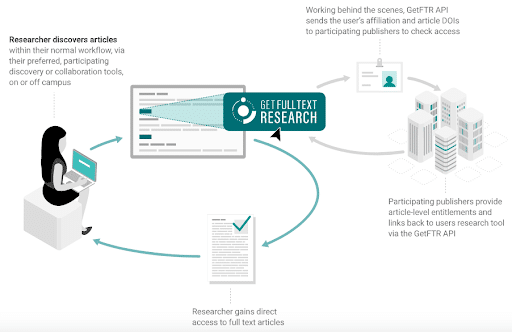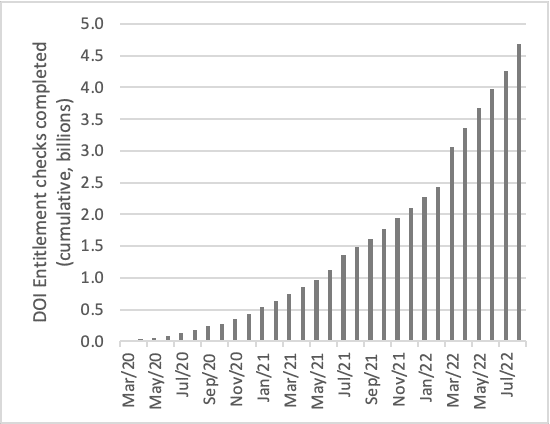Want to know more?
Are you interested in this project? Or do you have one just like it? Get in touch. We’d love to tell you more about it.
GetFTR (Get Full Text Research) is a backend API service developed by five scholarly publishers American Chemical Society, Elsevier, Springer Nature, Taylor & Francis and Wiley in 2019.
Working collaboratively to address one of the largest researcher pain points, these publishers are collaborating on backend API development under the name GetFTR (Get Full Text Research), to streamline access to scholarly content from today’s wide array of discovery and collaboration services that are commonly used in the scientific research process, such as:

partners across publishers, platforms and integrators
entitlement checks
links to high-quality content
GetFTR (Get Full Text Research) is a service founded by five scholarly publishers: American Chemical Society, Elsevier, Springer Nature, Taylor & Francis and Wiley. These publishers are collaborating for the purpose of streamlining access to scholarly content, reducing time taken to conduct research, and providing the researcher with up-to-date, trusted full-text, where their institution entitles them.
Researchers are increasingly using discovery services that are disconnected from publisher entitlements. This means that, when discovering articles, researchers are often unaware if their institution has provided access. This can lead to frustrating user journeys, with researchers clicking on article links, navigating publisher and aggregator websites to find out how to access content, only to be told at the very end that they do not have access.
Early research conducted by Equal Experts showed that researchers can click up to ten times before accessing an article. With GetFTR this is reduced to one click, or two if they haven’t yet signed in via their institution. When trying to read content across multiple publisher platforms, this increases the complexity as the researcher must authenticate for each platform.
Some of the issues researchers have today, which GetFTR addresses, include:
Equal Experts developed a backend API that enables discovery tools to check entitlements at the article level directly with the publisher. Where the researcher’s institution subscribes, the researcher is provided with a GetFTR smartlink from within their discovery service, which takes them directly to the article. If the institution uses federated authentication, and the researcher isn’t already authenticated, they will be taken directly to their institution login page removing the need to navigate publisher websites. Additionally, they only need to authenticate once to access content from all participating publisher platforms.

Equal Experts also developed a Self-Service Portal providing a number of tools, to ensure the onboarding process was smooth for both publishers and integrators. We also developed a Demo Discovery Service to illustrate how GetFTR works, and to support Publisher and Integrator decisions on whether to come onboard.
To address issues, the GetFTR API was developed with the goal of providing researchers with an improved user journey to scholarly content through:
We started an initial 3 month engagement to deliver a functional prototype. GetFTR was pleased with the prototype and the contract was extended for an additional 9 months to support piloting and further development of the service.
There were some initial challenges with the distributed architecture and authentication options provided in version 1 of the API. Following the pilot, version 2 was released, which supported IP authentication alongside federated authentication. Additionally, Integrators could now send DOI entitlement requests in batches.
The service uses CloudFront Functions to operate right at the edge of the AWS network, which makes it massively scalable and highly fault-tolerant against outages affecting other parts of the AWS network. This was critical for a service that essentially acts as an intermediary between Discovery Services and Publishers with a huge volume of requests per second. CloudFront Functions operate in a severely reduced environment, with a lot of JavaScript features turned off. It also provided the reassurance of knowing there was no additional latency, as the maximum execution time of these functions is 1ms.
GetFTR now works with over 30 partners across publishers, platforms and integrators and to date has returned over 800m links to high quality content, providing researchers with streamlined access to content. GetFTR has just hit the 5 billion mark for entitlement checks.

In the last 6 months, GetFTR has seen an acceleration of Publishers and Integrators coming onboard, providing a valuable service to researchers and publishers, and ensuring users are provided with streamlined access to the version of record of the scholarly content they need.
Are you interested in this project? Or do you have one just like it? Get in touch. We’d love to tell you more about it.